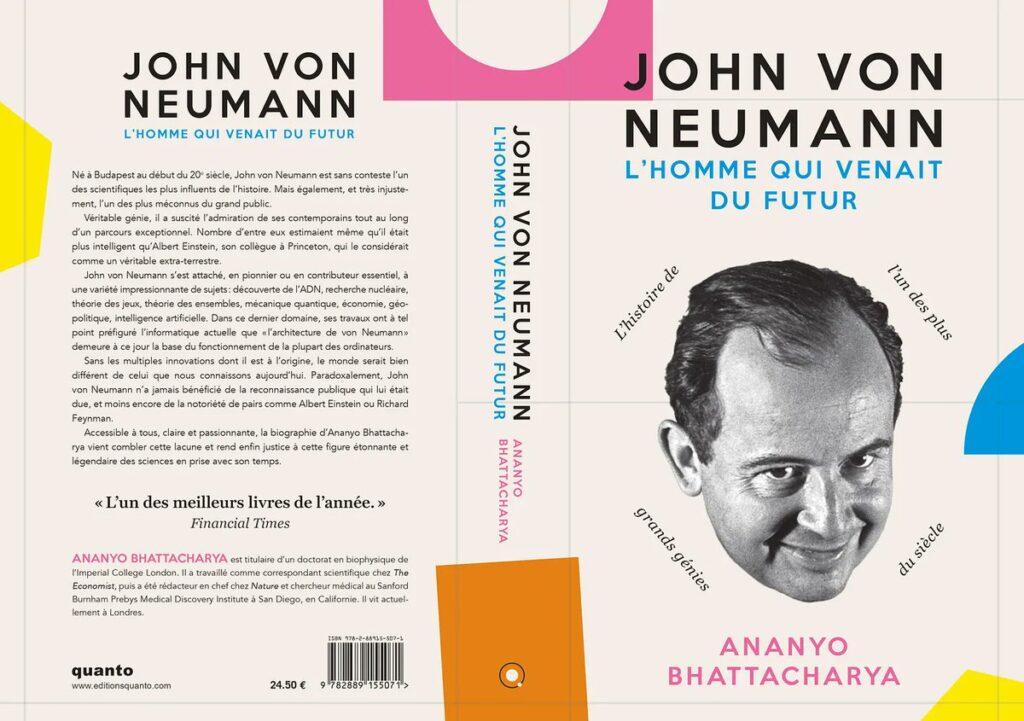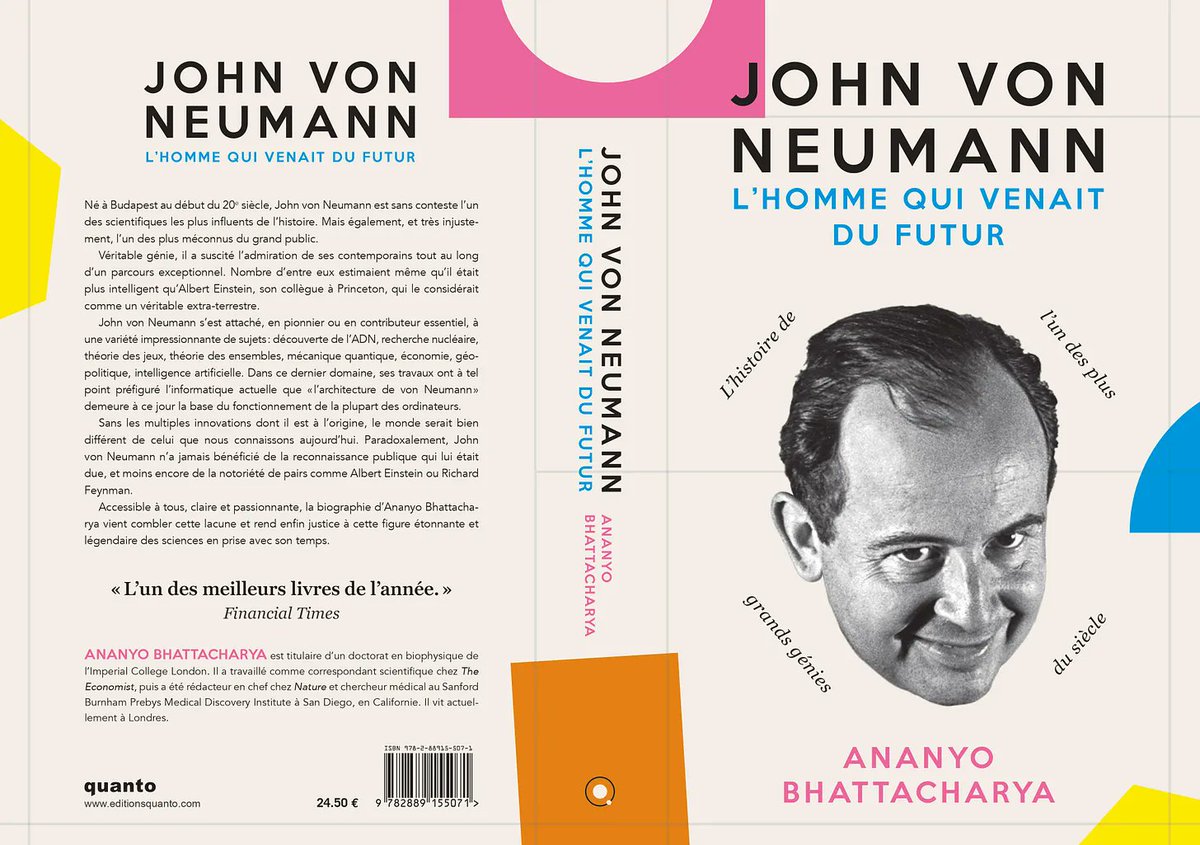
I’ve had the pleasure to write a foreword of the French translation of Ananyo Bhattacharya‘s biography of John von Neumann, translated by Anatole Muchnik and now published by Quanto.
You can read the French introduction and have a peek at the book’s first chapter (PDF).
In agreement with Ananyo, here is the English translation.
As you read the biography of John von Neumann, you will wonder what our world would be like if he had never lived. So many traces of his work still shape this world. More than half a century after his death, researchers are still unravelling the mysteries encoded in his formalization of quantum physics. Entire economies still evolve around his contributions to game theory: the same one that also guides geopolitical strategists designing doctrines of nuclear deterrence. Von Neumann actually helped build the first atomic bomb in the secret laboratories at Los Alamos. The electronic computers, whose development he directed, still inspire the billions of machines that have become essential to our daily lives, and that allow advances in artificial intelligence, ofwhich he was one of the first theorists. Even our understanding of living organisms inherits from his theory of self-replicating automata, which is closely linked to the principles of molecular genetics.
Would all this have existed without John von Neumann? An individualistic vision of society, carried by the old myth of the self-made man, suggests it would not. When we imagine that history is generated by “great men”, the role of an individual like von Neumann seems irreplaceable. This is the trap of biographies. When they are dedicated to influential personalities, they often err on the side of early Christian hagiographies: those accounts that set up the lives of “saints” as examples and invite us to worship them. In the age of nanotechnology and the first quantum computers, we are still struggling to free ourselves from an imagination populated by saints and prophets. Conversely, another trap lurks in essays dedicated to the history of science and technology: it is too easy to present this history as an ineluctable evolution, initiated at the origins of the Universe and progressing towards an apogee of knowledge and engineering. In such a vision, individuals do not matter. They can accelerate or delay the process, but only the process will acknowledge its own, and the end of time will come; as promised by the eschatologies of most religions and ideologies: capitalism, pseudo-Marxism, technocracy, transhumanism, you name it. Such narratives do not allow us to understand the world around us as the result of decisions made by individuals and by human communities.
Ananyo Bhattacharya avoids these two traps by writing both the biography of a man and the history of an era he helped shape. He takes care to introduce us to many key people in the journey of his character. Those who gave the necessary impulses to his intellectual journey, as well as those who seized his ideas and allowed them to succeed. Among these people, his second wife Klára, one of the first and most brilliant computer scientists, whom the history of science had long forgotten. The present biography has the great merit of shedding more light on the work of many women in the intellectual environment where von Neumann flourished.
In discovering his life, we discover a child prodigy surrounded by all the material comforts of a worldly family in the Budapest of the early 20e century. A teenager benefiting from the best colleges, supported by his teachers and inspired by his peers. A young man immersed in the intellectual and social effervescence of the Roaring Twenties. We also discover the descendant of a Jewish family, highly sensitive to the threats of the rise of anti-Semitism; a man heir to a need — close to an instinct of survival — to counter prejudice by succeeding in every field. Von Neumann suffered from premonitions about the genocidal catastrophe that was looming in Europe. Just as he would later suffer from trance-like states and nightmare visions, in which the descendants of the computers he helped to create would destroy all of humanity.
For better or for worse, he had access to everything that animated his time; to its neuralgic centres; to the most influential personalities in terms of decision-making power and scientific recognition. What distinguished him from his peers was an incredible mastery of synthesis. Intelligence, literally, is the ability to select elements from a large whole and to assemble them into a coherent system. The work of von Neumann attests to a prodigious degree of such an ability. In all the fields he crossed during his life, he managed to purify the ideas formulated by others, to free them from the superfluous — as one frees gold nuggets from the rock — to articulate them to each other, and to propose a new edifice of thought. His theoretical constructions and the technological devices that embodied them have, without a doubt, accelerated many diffuse trends in the spirit of his time.
And precisely in this point, his biography allows us to reflect on the role of exceptional individuals in history. When such a biography has the quality of the one proposed by Ananyo Bhattacharya, we begin to understand the individual as a being situated in the middle of a field of dominant forces, currents of thought and social movements that characterize an era. These currents can pass over him. But they can also, as in the case of von Neumann, converge in him and — if they do not destroy him — lend him their strength, and set him in motion. This, of course, requires the individual to reconcile a multitude of competing currents, to combine them, and find a common direction. It also requires the confidence and support of his entourage. Under such conditions, the currents of his era carry him far. The individual draws the flow of events and ideas in his wake, and sometimes reaches a speed so great that his movement inflects the lines of force of an era.
It also means that fate easily places the individual in a position through which the dominant currents do not pass, or only to her detriment; a position in which she lacks the inspirations and material resources necessary to act. How many unknown child prodigies were born in the working classes of the Austro-Hungarian Empire? How many talents were stifled in poverty or crushed by backbreaking work? John von Neumann, born János Lajos Neumann, son of the ennobled industrialist Maximilian Neumann von Marghita, had privileged access to scientific and technical knowledge, but the reality of the overwhelming majority of his fellow citizens eluded him. Not because of a lack of sensitivity — those close to him describe him as affable and capable of deep emotions — but simply because nothing exposed him to their conditions. Of the workers’ movements, he mostly remembers the Red Terror that Hungary suffered in 1919. Horrified by the rise of Nazism on the continent, he rejected Europe and preferred the American translation “John” of his first name, while keeping a nobiliary particle in front of his surname. His genius accelerated the trends of his time, of course, but especially those that animated his own social environment. He does not advance “Science” in its hypothetical totality, but certain ideological currents of science. He participated in the development of the military-industrial complex in the United States. In the 1950s, he advocated a preventive nuclear attack against the USSR. Game theory, which he developed with Oskar Morgenstern, offered solutions for a society that had little faith in the willingness of individuals to collaborate, preferring to limit the effects of their competitive egos. Von Neumann certainly believed more in collaboration than those who took up his theory, such as John Nash; in his own practice, he did not hesitate to exchange his ideas with other scientists. But game theory remains a framework of thought in which individuals do not concede anything unless it is for personal gain. Although he exchanged ideas with cyberneticians like Norbert Wiener, he did not invest much in cybernetic solutions for a balanced management of production or social relations. And one thinks of all the current problems that von Neumann’s intelligence could have helped us solve, if his cultural environment had allowed him to anticipate them earlier in his career. Among them, the accumulation of wealth in the hands of a few and the depletion of natural resources, that we inherit as a consequence of the ideologies of his time.
Nonetheless, the legacy of his work remains extraordinarily. His influence extends to the philosophy and geography that I have studied. Interested in numerical models of human societies, I encountered Thomas Schelling’s segregation model and other multi-agent simulations; they helped me understand how large-scale phenomena emerge from uncoordinated individual actions. John Conway’s Game of Life changed my perception of all organisms, and led me to question philosophical concepts such as “will” and “intentionality”. These models led me, finally, to their common predecessor: von Neumann’s self-replicating automaton — and to the light it brings not only to biology, but also to the very notion of the identity of the “self”. I remain fascinated by the hold of logical principles on the existence of living beings.
Until I discovered the bibliography in your hands, I was too unaware of the influence of von Neumann’s work on such masters of science fiction as Philip K. Dick; just as I was unaware of his direct links to so many other personalities, whom I associated with entirely separate domains. Whatever the field of specialization of the reader of this book, his or her surprise will no doubt be similar to mine. She will be surprised by the multitude of links that connect her to the life of this extraordinary twentieth-century personality. I wish her a pleasant and enjoyable reading.
